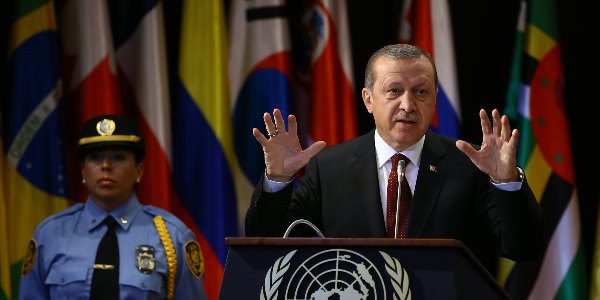
After President Recep Tayyip Erdoğan’s official visit to the three Latin American countries of Chile, Peru and Ecuador, the presidential systems implemented in the region have become one of the hot topics of discussion about political systems and a new constitution in Turkey. Contributing to these discussions appropriately without misunderstanding and prejudice is difficult, as they are critical. After the 1990s, Latin American countries underwent democratization processes and the position presidents played was significant in these processes. Thus, understanding the outlines of the Chilean system can be an initial point to comprehend other areas of the region. THE EXECUTIVE BRANCHEven if the historical roots of the presidential system in Chile can be traced back to its 1925 constitution, the system in effect today was established after the 1980 constitution. Chile has a unitary and bicameral system where the state administration is functional and territorially decentralized. According to Article 25 of the 1980 constitution, to be elected president of the Republic, the candidate must have Chilean nationality, be up to or over 35 years of age and hold the other qualities necessary to be citizen. The president can exercise his functions for a period of four years and may not be re-elected for the following period. In other words, at least a one-term break is compulsory. The president is elected by direct vote, winning by receiving the absolute majority of valid votes. The presidential election is held in conjunction with parliamentary elections in the manner determined by the respective constitutional law. If the presidential election that contains more than two candidates and none obtain more than half the valid votes, there will be a second round of voting to limited to the candidates who obtained the two highest vote totals and the winner is the one that receives the most votes. This new vote is verified in the manner prescribed by law. As the head of the executive branch, the president has broad authority with special powers such as contributing to the making of laws under the constitution, sanctioning and promulgating them, convening and closing the Congress by stating the reason, declaring states of exception in cases and forms prescribed in the constitution, and to appointing and removing ministers, deputies, mayors, governors, ambassadors, diplomatic ministers and representatives from international organizations at will. Besides these powers, the president can appoint magistrates and prosecutors from the Courts of Appeals judges and lawyers on the proposal of the Supreme Court and the Courts of Appeal, respectively, members of the Constitutional Court, and judges and prosecutors of the Supreme Court and the attorney general with the consent of the Senate. After the constitutional amendment in 1989, the president’s right to dissolve parliament was abolished. When it comes to the budget, the president, with the signature of all the ministers of state, can decree payments not authorized by law to meet needs arising from postponed public calamities, foreign aggression, internal commotion, serious injury or danger to national security or the depletion of resources to maintain services that cannot be stopped without serious damage to the country. Payments made under these circumstances cannot exceed 2 percent annually of the amount of expenditure authorized by the Budget Law. After the election, the president’s relations with his political party automatically end. However, because of dominance of political parties in the system, the president unofficially maintains his relations. THE LEGISLATIVE BRANCHThe National Congress of Chile (Congreso Nacional) is based on a bicameral system consisting of the Chamber of Deputies (Cámara de Diputados) with 120 members and Senate (Senado) with 38 representatives. The Chamber of Deputies is composed of members elected by the direct vote of constituencies and is renewed in full every four years. Senators remain in office for eight years and half of them in turn are renewed every four years through a binomial system. This system separates the country into senatorial districts and each of them has at least one representative. The exclusive powers of the Chamber of Deputies are to supervise the acts of the government by adopting agreements or suggesting observations, summoning a minister of state under special circumstances, creating special investigating commissions at the request of at least two-fifths of the deputies, declaring whether or not there have been accusations of the president seriously affecting the honor and security of the nation or openly violating the constitution or laws. In the case of the Senate, its exclusive powers are acting as a jury in investigating commissions, hearing jurisdictional disputes that arise between political or administrative authorities, granting recovery of citizenship and declaring the incapacity of the president arising from physical or mental impairment. THE JUDICIAL BRANCHThe-20 member Supreme Court of Chile is at the highest point of the judicial system in the country. Except the Constitutional Court, Board of Election and Military Courts, all courts are under supervision of the Supreme Court. The president of the Republic, with Senate approval, appoints judicial the prosecutors of the Supreme Court. The president of the Republic also appoints judicial ministers and attorneys of the Courts of Appeal while the Supreme Court proposes three candidates. Judges can be discharged on the grounds of impeachment. Superior Court judges, judicial prosecutors and lawyers of the judiciary cannot be apprehended without order of the competent court, except in cases of criminal activity. It should be noted that each presidential system, independent from legal practices and rules, has unique characteristics arising from social, cultural and traditional aspects of the specific country. Thus, a reductive approach to evaluate systems without concerning distinctive features of each country can cause misinterpretations in debates. Debates on a presidential system in Turkey should be more fact-based and offer reliable information to create a more productive platform for discussion. [Daily Sabah, February 5, 2016] |
Category: Turkey
-

AK PARTİ FILES /// Presidential System : A Latin American Experi ence
-
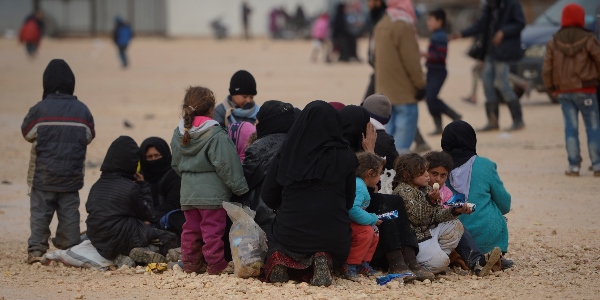
MIDDLE EAST FILES : No Time for Another Sykes-Picot

Whether they are in Washington, Ankara, Irbil or Geneva, "It’s the end of Sykes-Picot," Middle East experts and politicians often argue in discussions about the region’s future. Seeking to redraw the map of the Middle East, Sykes-Picot’s challengers are also quick to pronounce dead the post-World War I order. Ironically, both DAESH’s claim to caliphate and Kurdish nationalists’ dream of an independent state rest on the core premise that the Sykes-Picot agreement has become obsolete. Those who disagree with this assessment, too, invariably know deep inside that the Middle East will never be the same. Nowadays, American decision-makers looking to fight terrorism, regional powers fighting proxy wars and Russian generals bombing civilians all have something in common: They are updating their playbooks and reconsidering traditional alliances.
A quick glance at media reports would establish that the challenges are great. On one hand, the Russians argue that Turkey is preparing to invade Syria. On the other, Kurdistan Regional Government (KRG) President Masoud Barzani says his government will hold a referendum to attain independence. At a time when superpowers and regional players seek to dictate the new rules of the game in battlefields across the Middle East, the main problem is that hardly anyone can guess what exactly will replace Sykes-Picot.
To be clear, the artificial regional order sanctioned by France and the United Kingdom – the Great War’s victors – had zero chance of survival all along. In places like Iraq and Syria, the repression of the majority by artificially-empowered minorities could not last. U.S. foreign policy, however, notably expedited the process of dissolution. Arguably the most crucial development in recent years was the U.S. invasion of Iraq. Unable to replace Saddam Hussein’s regime with a functional government, Washington paved the way to sectarian clashes by putting Nouri al-Maliki, a Shiite politician with a sectarian platform, in charge. In retrospect, it was hardly surprising that the Sunni anger across the country led to the rise of DAESH. Meanwhile, Syrian leader Bashar Assad’s regime lost control of Syria by disproportionately responding to the Arab Spring revolts. In the end, violent conflicts in Iraq and Syria turned the Middle East into hell.
Moving forward, the demise of nation-states in Syria and Iraq will irreversibly destroy the regional status quo. Keeping in mind that these post-Ottoman nation-states were the most successful experiments in the region, there is no reason to believe that Gulf nations will prove more persistent. To make matters worse, the Geneva-III talks established beyond all doubt that the U.S. and Russia merely pay lip service to the territorial integrity of Iraq and Syria. Having alienated Sunni Arabs to facilitate DAESH’s rise, superpowers now pave the way to a new wave of violence by working with the Democratic Union Party (PYD) and its armed wing People’s Protection Units (YPG) in northern Syria.
Regional powers, to be clear, aren’t doing much better. Under the pretext of pursuing national interests, they promote sectarian clashes – a policy that won’t help create a new regional order. Their current plans, instead, are likely to create new failed states down the road. Faced with challenges to their territorial integrity, unconsolidated nation-states across the Middle East are likely to spark new conflicts.
The only way out of the current crisis is to promote integration instead of disintegration. Although Turkey has been calling on regional governments to cooperate more closely, things are going south. One would only hope that the humanitarian crises in Syria and Iraq will help other governments wise up and take necessary steps before it’s too late. After all, another Sykes-Picot agreement won’t bring peace and stability to the Middle East.
[Daily Sabah, February 8, 2016]
-
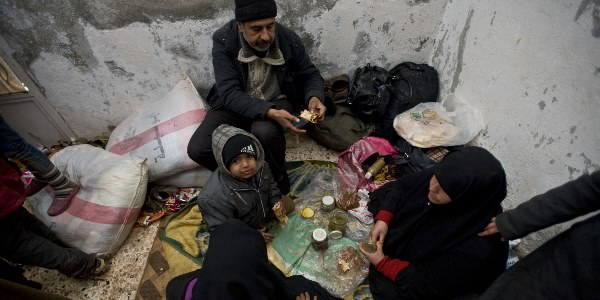
SYRIA FILES : Forcing Syrians to Flee the Country is a Tactic of the Syrian Regime

Since the beginning of the refugee crisis in the Syrian civil war, most astute observers of the conflict have said that the ultimate long-term solution for the Syrian refugee crisis is building peace and stability in the country to enable refugees to freely go back to their homes and continue their lives from the point when they left. The belated attempts by the international community to accept some refugees was only a bandage for the growing and deepening problem of Syrian refugees. In the absence of a feasible long-term solution it is unrealistic to expect the flow of refugees from the conflict to end.
Last week, we saw this reality in Syria once more when the intensifying Russian airstrikes in northern Syria started to generate another major wave of refugees coming to Turkey. Since the beginning of the crisis, there has been a correlation between any intensification of the crisis and the number of refugees fleeing to neighboring countries. Since the beginning of the airstrikes, the use of Scud missiles and chemical weapons, we have seen a huge number of Syrian civilians fearing the increasingly violent war machine of Bashar Assad’s regime fleeing to adjacent countries. With the rise of DAESH, we saw another major wave, this time from Iraq as well as Syria. The most significant wave of refugees was from Kobani, which probably had one of the highest numbers in just a few days, and from Sinjar in northern Iraq. Later, with the People’s Protection Units’ (YPG) capture of Tal Abyad, another major flow of refugees started. Later, some human rights group reported that some of these people were forcefully evicted from their homes by YPG forces. In the most recent phase of the conflict with Russian airstrikes and their gradual intensification on opposition-held territories, we started to see another major wave of refugees.
Since the intensification of the attacks in the Turkmen Mountain region against the Turkmens there, observers of the refugee problem have pointed to the danger of the continuation of similar attacks in other parts of Syria, which could generate similar refugee problems. The international community mostly ignored these calls and warnings, and now we are facing another critical juncture in the crisis with increasing attacks on areas surrounding Aleppo. Last week, Turkish authorities indicated that at least 70,000 people fleeing heavy airstrikes on their towns and cities were walking toward the Turkish border. Some 20,000 of them have already gathered on the Turkish border. Considering the distance, the weather conditions and increasing attacks, these people face serious dangers. In a similar way, the Assad regime, with the support of the Russian air force, has been starving towns as a weapon through sieges in recent months. Last month, dozens of people in the town of Madaya died from starvation. Many observers warned that the use of this tactic could generate a serious humanitarian crisis. However, the reaction from the international community was insufficient to deter the regime from using similar tactics in other areas. As suspected, now the regime uses this tactic in various parts of Syria and uses the threat of starving Syrians to empty cities and towns.
The creation of this new crisis shows that the regime continues to use the tactic of emptying towns and cities to capture territory. From the beginning, the regime tried to scare and threaten civilians, and now with the use of starvation, various chemical agents, barrel bombs and the Russian air force, a critical point has been reached, and a majority of Syrians may find that leaving the country is the best and last course of action. This means that if the regime is not stopped from using this horrendous tactic – threatening its own citizens, we will face more refugees and internally displaced people in the coming months. It must be remembered that the regime used the most horrible tactic of starving people while preparing for the talks in Geneva, and the intensifying of airstrikes took place, while their representatives were making their case to the U.N. special envoy. This shows the sincerity of the Syrian regime with regard to a political solution and the outcome of the inaction of the international community. In the coming days and weeks, we need to be cautious about what the Syrian regime means concerning a solution, as the regime and its allies may think that emptying most of the country is a viable solution to win the war.
[Daily Sabah, February 8, 2016]
-

PKK FILES : The PKK’s New ‘Reconciliation Table’ Strategy
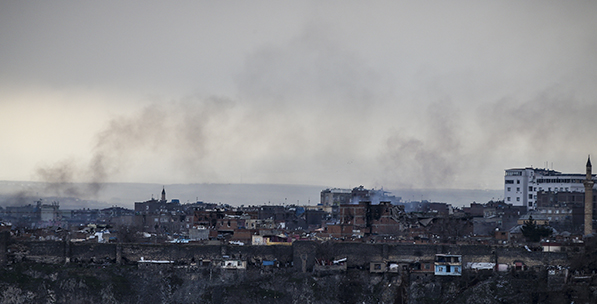
The ongoing conflict between the state’s armed forces and the PKK in the southeast continues with growing intensity. While on the one hand the state is moving forward around a new and encompassing security concept of destroying the PKK in cities to establish public order once again, the PKK is, in turn, continuing the struggle around a new battle concept of digging ditches, setting up barricades and planting roadside bombs in the middle of city centers and apartment buildings.
Throughout this process, the PKK has been conducting a policy of intimidation against civilians, especially due to the lack of support from the Kurdish population in the region for the new, armed rebellion it began after July 14, 2015. The PKK terrorizes daily life by systematically causing civilian deaths and the destruction of public buildings and civilian dwellings. Currently, PKK leaders encourage the Kurdish public to “rebel in every area” and ask them not to receive any public services from the Turkish government. The PKK can easily use violence against those it considers to be conspirators in the Kurdish population for receiving public services from the state. Furthermore, the people who are killed or injured due to PKK violence are being cast as victims of “civilian massacres” systematically conducted by the state.
The petition that has been widely debated in the past few days that was signed by 1,128 academics that mostly support the Peoples’ Democratic Party (HDP), titled “We will not be a party to this crime,” also has the purpose of spreading the propaganda of this particular approach of the PKK. Indeed, the petition, which accuses the government of Turkey of having conducted genocide against its own people, has received harsh reactions from government officials. At the foundation of this lie is the thought that there is a desire to impede the state’s struggle with terrorism. In the petition, the theme of genocide is placed at the fore, and public officials who are at the head of the struggle against terrorism are threatened with being convicted by international courts. Additionally, the petition serves to garner legitimacy in the international arena for the PKK’s armed struggle with its agenda of separatism. Just as the HDP has taken up serving the PKK’s ends with politics as its principle, so have academics who support the HDP taken up the effort to garner international legitimacy for the PKK and cast the state as a systematic killing machine. In this sense, the petition underlines the PKK and HDP’s perspective of either autonomy or fascism, and thus labels the PKK the founding actor of autonomy, while the state is the fascist actor.
PKK SOFT POWER
The PKK organizing such a campaign by assembling pro-HDP academics is not just about military ends. While the PKK is attempting to win on the ground through hard power, it is also in search of developing a new soft power strategy. The most important reason for this is the PKK’s efforts to go back to the table. This means that because the PKK has been cornered, it now shows a desire to go back to the reconciliation table. It is obvious that the PKK has experienced many losses due to operations led by the state. But still, the PKK continues its efforts to get back to the reconciliation table in a manner that will serve its strategic aims. In this sense, the PKK is doing two things. The first is to write a new history about the now defunct reconciliation process, and the second is to find an international partner for a new reconciliation process.
The PKK has been advancing the thesis that the reconciliation process that began in 2013 ended due to the state’s fears. The developments in Rojova are alleged to be the main cause for this fear and the legitimacy gained there has brought President Recep Tayyip Erdoğan and his crew to the point of madness, the argument goes. With this, the National Security Council’s Oct. 30, 2014, meeting is shown as the turning point, and the reconciliation period ended due to the decision arrived at there.
However, three weeks before this meeting, the PKK and HDP had called on Kurds to come to the streets using the DAESH siege of Kobani as a pretext, and more than 50 civilians lost their lives in the ensuing street violence. Another question that requires answers is why the PKK currently keeps referring to the “Dolmabahçe meeting” that occurred after this date and why it waited until July 14, 2015, to say, “The reconciliation process has ended, the revolutionary people’s fight has begun,” when its imprisoned leader, Abdullah Öcalan, had given a Nevruz message on March 21 in favor of the reconciliation process.
The second step the PKK has taken within the framework of returning to the reconciliation table has been to find itself an international partner. In this sense, as has frequently been said previously, it has requested that the U.S. be involved as a third party in the process. A few days ago Kurdish Communities Union (KCK) Vice-Chair Cemil Bayık repeated this call and invited the U.S. to the table.
As before, the PKK is attempting to use the reconciliation table as a means of creating a hegemonic arena for itself in the new period. From the start, however, the Turkish government considered the reconciliation process quite legitimately as a means of establishing its hegemony within national borders. It is not possible now to establish a new reconciliation process without placing this concern of the Turkish state in the center. The one who must know this before anyone else is Turkey’s ally, the United States.
[Daily Sabah, January 22, 2016]
-
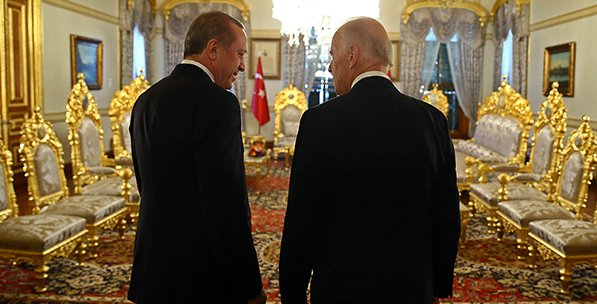
AMERICA FILES : Turkish-American Relations Revisited

In a column a few weeks ago regarding the Insight Turkey Annual Conference, I gave a synopsis of the debate among the participants of a panel on Turkish-U.S. relations. Responding to a question on the panel about the possible “spoiler” of Turkish -US relations in 2016, there was a consensus among the panelists on the possible negative impact on bilateral ties by the Democratic Union Party’s (PYD) armed People’s Protection Units (YPG) in Syria. This issue has been negatively affecting the relationship between Turkey and Syria, especially over the last two years. Other than the immediate impact stemming from the publicity this disagreement involves, there is also the long-term problem that this tension is generating for mutual trust between the two countries.
This is not the first time PKK-related issues have caused problems in bilateral relations. In the immediate aftermath of the U.S. invasion of Iraq, Ankara and Washington experienced tensions in bilateral relations because of the lack of satisfactory U.S. action against PKK targets. Increasing PKK activity and disagreement between Turkey and the U.S. during this period generated significant tension, while the difference between the two countries regarding the PYD and YPG started to create a more serious disagreement, deteriorating relations especially during the siege of Kobani.
The fact that some U.S. officials publicly criticized Ankara for not doing enough in Kobani, and the fact that the U.S., despite opposition from Ankara, airdropped weapons to the YPG added to this crisis. For Ankara, the operational cooperation and membership overlap between the YPG and PKK make the two organizations one and the same. This overlap and cooperation could generate a major security risk for Turkey by increasing the capabilities of the PKK on the ground.
There was already some concern within the Turkish security establishment about the PKK’s unwillingness to pull its forces out of Turkey during the cease-fire period. The U.S. assistance to the YPG in this period both legitimized and emboldened the organization in the region. After the sudden termination of the cease-fire agreement, the PKK demonstrated that some of Turkey’s concerns regarding the increasing sophistication of PKK operations were well-founded. Since then, the U.S. has stepped up its support for the YPG and Ankara has continued to express its concern meaning the discord between two countries continues to test their bilateral ties.
In the meantime, Turkey faced a series of PKK attacks in southeastern cities and challenges to public order from its affiliated organizations. Since then, Turkey launched a major offensive against PKK targets. Operations against DAESH also intensified during this period. At this critical juncture, Ankara is facing two separate terrorist threats from two different organizations. While pursuing and intensifying the crackdown on these groups in Turkey, Ankara is also taking precautions to stop any form of infiltration by the members of these groups from Syria and Iraq into the country. On this point at least, there is not much difference of opinion between Turkey and US on how to fight DAESH with operational cooperation and coordination in border security arrangements between the two countries.
Nevertheless, Ankara insists that the main problem is the state of affairs that Syrian President Bashar Assad’s regime has generated and that a solution in Syria is necessary to resolve the widening regional crisis. What is more, the distinction that Washington claims to exist between the PKK and YPG is a problem to Turkish-U.S. relations. Washington seemed to recognize the concerns Ankara has conveyed about the YPG sufficiently enough to avoid them becoming a threat to Turkey, but there are serious concerns regarding operational cooperation, exchange of knowhow and membership overlap between the PKK and YPG.
It will take stronger precautions to convince Ankara on the safety of American policy, and in the absence of such measures the issue will continue to be a spoiler for the two countries’ relations. It can be expected that debates about the airfield in northern Syria will also be part of discussions in the coming weeks.
[Daily Sabah, January 25, 2016]
-
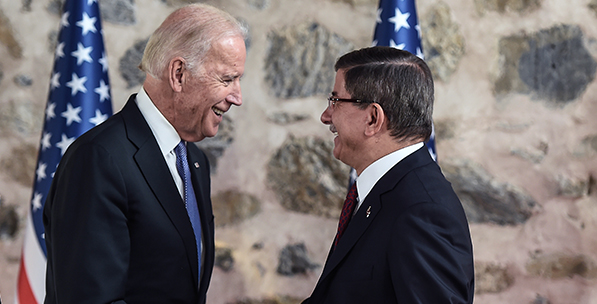
AMERICA FILES /// Turkish-US Relations : Strangling Strategy With Tactics

In the past week, undoubtedly one of the most important matters on the agenda of Turkish politics was U.S. Vice President Joe Biden’s visit. Above all else, Biden’s visit was important in terms of evaluating the potential for collaboration between the U.S. and Turkey on Middle Eastern politics in general and, more specifically, on Syria and Iraq, as well as negotiations regarding the various differences of opinion. Discussions on what Biden might have in his dossier had already begun before he arrived. The general idea was that Biden and Turkish officials would discuss the topics of the struggle with DAESH, Turkish-Russian relations, the status of the Democratic Union Party (PYD), the structure of the Bashiqa camp, border security and a new train-and-equip program. Indeed, Biden came and met first with Prime Minister Ahmet Davutoğlu and President Recep Tayyip Erdoğan to speak about these topics.However, the other factor that made Biden’s visit interesting and media-focused was the frequency of his visits. Biden only met with the radical opposition, where opposition to Erdoğan is at the center of political discourse, causing many debates. The journalists who attended these meetings gleefully chose to interpret this as a victory won over Erdoğan. The fact that Biden drew attention to the freedom of the press and the freedom of expression in this meeting, where he stressed the message that there must not be capitulations on the freedoms of the press and expression, is significant.
Notably, the political message behind Biden’s sole acceptance of journalists who oppose Erdoğan as his respondents is obvious. Biden and American decision makers are aware of the administrative fight ongoing in Turkish politics as well as how this fight is reflected in the media. The socio-political opposition representatives Biden met with are those who have made their opposition to Erdoğan an identity, even an obsession. They include those who supported, whether openly or clandestinely, the Gezi protests, the Dec. 17 and Dec. 25 coup attempts on the part of the Gülen Movement and, later, regarding the new struggle instigated by the PKK terror organization against the state for the purpose of bringing Erdoğan’s administration down. Under the headlines of "the freedom of the press" and freedom of expression, at the center of the invisible political struggle therein lies the obstruction of political normalization and the transformation that is occurring with Erdoğan’s leadership. This naked truth is a situation known quite well by the actors who know and recognize Turkey. Of course, Biden and those who arranged his program know this quite well, too.
So, why did Biden lean toward such a symbolic stance against Erdoğan’s? The reason for this is not the U.S.’s supposed keen interest in Turkey’s problems regarding the freedom of the press. U.S.-Turkish relations have a long past, and modern Turkish history is full of incomparably heavy obstacles to the freedom of expression and the press when compared to today. Within this historical process, we all know that the U.S. did not engage in symbolic intervention in Turkey through rhetoric advocating for the freedom of expression. Another thing we know is that, for the U.S., when its own national interests are the point in question, the U.S. throws the topics of freedom of expression and freedom of the press out the window. However, what is more important is that the U.S. uses the rhetoric of freedom of expression and the freedom of the press in its foreign policy processes in countries that U.S. officials want to convince to take a certain position or to impose a new situation.
Then, in this case, what is the new position that the U.S. wants to convince Turkey of or that the U.S. wants to impose on Turkey? The U.S.’s main concern is making Turkey more influential in the struggle against DAESH. At this point, the U.S. is asking that Turkey take on much more responsibility in that regard. Despite the fact that Turkey considers DAESH a terrorist organization and is fighting DAESH both inside and outside the country, the U.S. is still asking that Turkey contribute much more.
The most fundamental issue for the U.S. is that Turkey regards DAESH as the upmost threat and must mobilize its military capacity against it. Another dimension is that, from the U.S.’s perspective, Turkey should not regard the PYD and its armed People’s Protection Units (YPG), which the U.S. sees as the primary ground forces used in the struggle against DAESH, as a threat. Ankara’s main point of concern during this process has been that the PYD is the PKK’s extension in Syria and the guns given to the PYD and YPG are being used in PKK terror attacks in Turkey.
Davutoğlu and Erdoğan both clearly explained Turkey’s approach to the PKK and the PYD in their meetings with Biden. In response, Biden reaffirmed that the PKK is a terror organization like DAESH; however, the U.S. will work together with the PYD. There is a crucial point that American decision makers must realize. The more successful Turkey is in its struggle against the PKK, the more likely it is to successfully fight against DAESH. During this period, it is paramount to stop giving the PYD, also known as the PKK’s Syrian extension, various tactical realities and privileged positions. U.S. foreign policy makers must stop strangling strategy with tactics.
[Daily Sabah, January 29, 2016]
